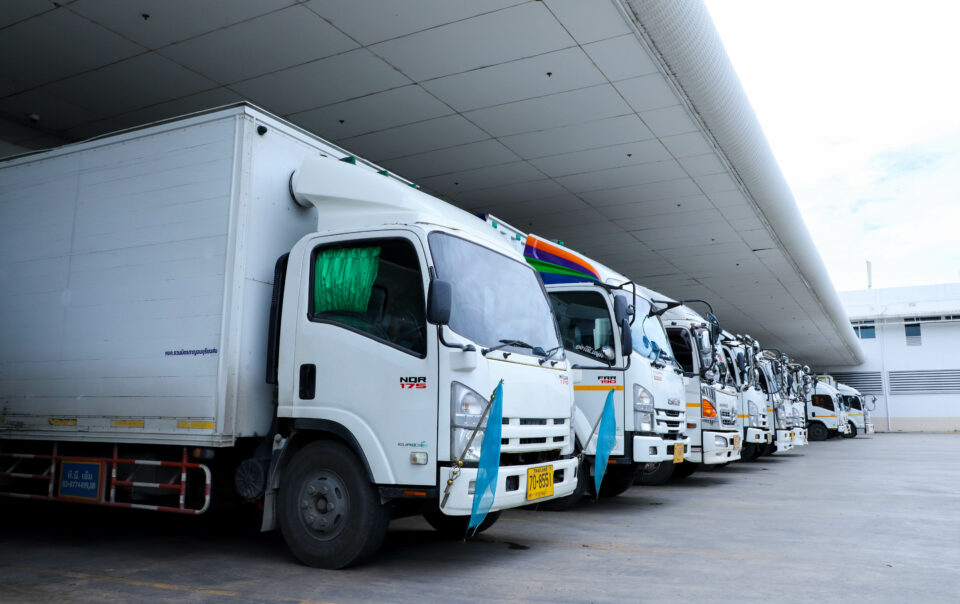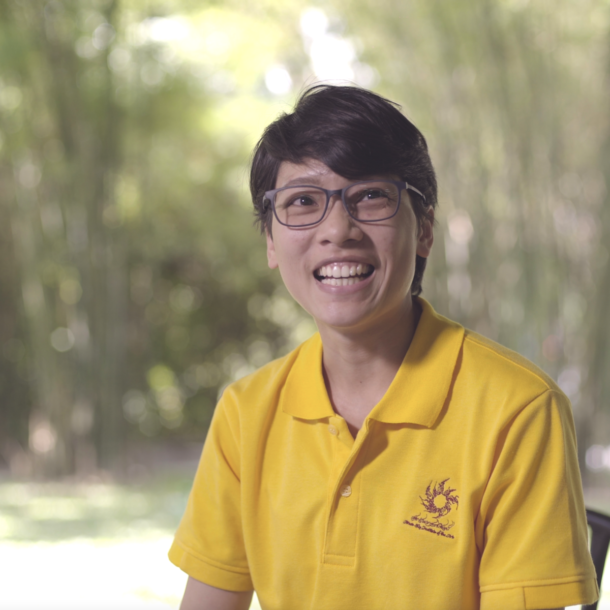
หนึ่งในเป้าหมายการพัฒนาที่ยั่งยืนที่มีธงสำคัญอยู่ที่การพัฒนาคน คือ เป้าหมายข้อที่ 4 Quality Education ที่ว่าด้วยเรื่องของคุณภาพการศึกษา
แอดมินมีโอกาสได้พูดคุยกับผู้ที่คว่ำหวอดกับเรื่องนี้ ทั้งภาคเอกชน ภาครัฐ และภาคประชาสังคม นั่นคือ รศ.ดร.สมภพ มานะรังสรรค์ อธิการบดี สถาบันการจัดการปัญญาภิวัฒน์ สถาบันการศึกษาเพื่อสังคมในกลุ่ม CP ALL ผศ. อรรถพล อนันตวรสกุล คณะครุศาสตร์ จุฬาลงกรณ์มหาวิทยาลัย และผู้อำนวยการศูนย์วิจัยและพัฒนาการศึกษาเพื่อการพัฒนาที่ยั่งยืน และ คุณปฏิพัทธ์ สุสำเภา จากกลุ่ม Open Dream ทั้งสามท่านได้ให้มุมมองเกี่ยวกับการพัฒนาคุณภาพการศึกษาของบ้านเราไว้อย่างน่าสนใจ
เข้าถึงได้ แต่คุณภาพไม่สม่ำเสมอ
บทสนทนาของเราเริ่มต้นที่สถานการณ์การศึกษาในปัจจุบัน ผศ. อรรถพล เล่าให้ฟังว่า ตลอด 15 ปีที่ผ่านมา ประเทศไทยประสบความสำเร็จที่ทำให้เด็กได้เรียนจบระดับประถมศึกษา หรือจบ ป.6 ได้ 100% แต่ในการศึกษาภาคบังคับ 9 ปี หรือถึงในระดับมัธยมต้น ยังมีเด็กหลุดจากโรงเรียนไปพอสมควร และมีงานวิจัยพบว่าเด็กหลุดจากระดับมัธยมปลาย หรือ ม 6 มากถึง 46% เท่ากับว่ามีเด็กเพียง 54% ที่เรียนครบ 12 ปี

แต่ที่เป็นปัญหามากกว่าการเข้าถึงการศึกษา ก็คือ เรื่องคุณภาพของการศึกษาที่ไม่สม่ำเสมอกันของโรงเรียนขนาดใหญ่และขนาดเล็ก โรงเรียนในเมืองและชนบท แม้แต่กรุงเทพเอง ที่ดูเหมือนจะมีความพร้อมสูง ก็ยังมีปัญหาเรื่องนี้ นอกจากนี้ โรงเรียนขนาดใหญ่ยังกระจุกตัวในเมือง ทำให้ทรัพยากรกระจุกตัวตามไปด้วย ในขณะเดียวกันโรงเรียนขนาดกลางและขนาดเล็กก็ถูกทำให้เสียเปรียบ ผู้ปกครองส่วนใหญ่จึงมีคำถามเรื่องคุณภาพของโรงเรียน
Work-based Education สร้างคนให้คิดเป็น-ทำเป็น
รศ.ดร.สมภพ ในฐานะภาคเอกชนที่ลุกขึ้นมาทำงานเรื่องการศึกษา แสดงความเห็นว่า ในมุมมองของ CP ALL การศึกษาคือการสร้างคน ซึ่งเป็นกุญแจนำไปสู่ความสำเร็จในทุกเรื่อง CP All จึงให้ความสำคัญกับเรื่องนี้ โดยจัดตั้งสถาบันการศึกษาใน2 ระดับ ระดับอุดมศึกษา คือ สถาบันการจัดการปัญญาภิวัฒน์ (PIM) และระดับอาชีวศึกษา คือ วิทยาลัยเทคโนโลยีปัญญาภิวัฒน์ (PAT) และมองว่าการพัฒนาคนให้เป็น Smart People ต้องติดอาวุธ 3 ด้าน คือ มีทักษะฝีมือ มีภูมิปัญญา และมีคุณธรรม
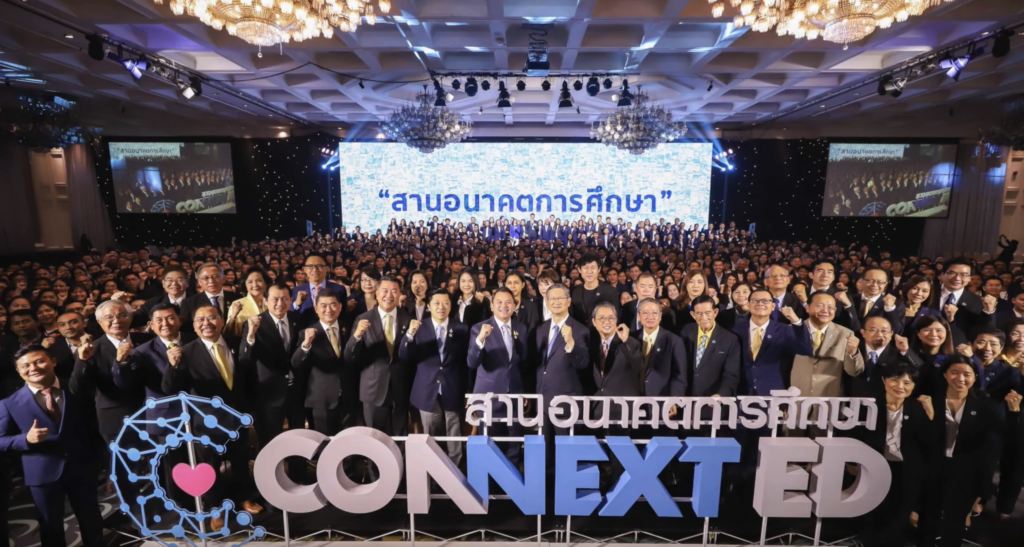
ที่สำคัญ คือ ต้องพร้อมทำงานได้ทันทีเมื่อสำเร็จการศึกษา หรือที่เรียกว่า Ready to work จึงเป็นที่มาของแนวคิดหลักในการจัดการศึกษาของปัญญาภิวัฒน์ ที่เรียกว่า Work-Based Education โดยใช้หลักวิชาการผสานการปฎิบัติ เป็นการเชื่อม2 เรื่องเข้าหากัน คือ ความรู้ทางวิชาการที่ใช้งานได้จริง ความสามารถที่จะนำวิชาการไปใช้ประโยชน์ได้ เพื่อสร้างคนให้คิดเป็น ทำเป็น ปัญญาภิวัฒน์ยังเน้นการทำงานร่วมกับเครือข่าย เพราะเชื่อว่าการสร้างคนต้องร่วมมือกัน ต้องระดมสรรพกำลังทุกภาคส่วนมาช่วยกัน เป็น Networking University
เรียนรู้-รู้เรียนให้ความรู้ติดสมอง
ในขณะที่ คุณปฎิพัทธ์ แบ่งปันมุมมองว่า Open Dream พยายามสร้างเครื่องมือทางดิจิตัล เพื่อส่งเสริมให้เกิดการศึกษาที่มีประสิทธิภาพ โดยมีวิธีการทำงานที่อิงกับทฤษฎีการเรียนรู้บันได 4 ขั้น คือ 1) บอกให้ทำ 2) สอนให้ทำตาม 3) เรียนรู้ผ่านการลงมือทำและเห็นผลลัพธ์ด้วยตัวเอง 4) เรียนรู้ผ่านเครือข่ายและให้ความรู้ติดในสมองมากขึ้น ซึ่งเมื่อพูดถึงการศึกษาที่มีคุณภาพ Open Dream มองว่าต้องทำให้คนเรียนรู้ในขั้นที่ 3 ให้ได้ จึงหาวิธีที่ทำให้ความรู้อยู่ในสมองมากขึ้นโดยเฉพาะ ความรู้ที่สอนได้ยากในห้องเรียน ซึ่งควรใช้เครื่องมือใหม่ๆ ช่วยทำให้เกิดการเรียนรู้ เพื่อจะได้เห็นผลลัพธ์
เครือข่ายร่วมสร้างคุณภาพการศึกษา
เมื่อถามถึงการขับเคลื่อนการศึกษาที่มีคุณภาพของแต่ละภาคส่วน รศ.ดร. สมภพ แบ่งปันประสบการณ์ว่า จากการที่สถาบันการจัดการปัญญาภิวัฒน์ให้ความสำคัญกับการสร้างคนให้เข้าสู่โลกการทำงานได้จริงมากขึ้น โดยเน้นเรื่องวิชาการผสานการปฏิบัติ ที่ผ่านมาพบว่า ข้อได้เปรียบของเด็กปัญญาภิวัฒน์ คือ เรื่อง ทักษะการสื่อสาร (Communication skill) และการมีปฏิสัมพันธ์กับผู้อื่น (Human Relationship) ซึ่งเป็นคุณสมบัติที่ได้มาจากระบบการเรียนการสอนแบบ Work-based Education ที่นักศึกษาได้มีโอกาสฝึกงานในสถานประกอบการจริง นอกจากนี้ ปัญญาภิวัฒน์ ยังให้โอกาสทางการศึกษาแก่ผู้ด้อยโอกาสด้วย โดยนักศึกษาส่วนใหญ่เป็นเด็กต่างจังหวัด มีจำนวนมากที่เป็นคนแรกของครอบครัวที่มีโอกาสได้รับการศึกษาระดับปริญญาตรี ซึ่งสถาบันฯ จะมีทุนการศึกษาให้ และระหว่างฝึกงานยังจะได้รับเบี้ยเลี้ยง ที่สามารถส่งเงินช่วยครอบครัว เมื่อนักศึกษาจบการศึกษาก็สามารถทำงานได้เลย บางคนไม่อยากเป็นลูกจ้างก็สามารถกลับไปทำงานที่บ้านได้
Anywhere work เพื่อเพิ่มทักษะดิจิตัลให้คนชายขอบ
ไม่เฉพาะองค์กรขนาดใหญ่ที่ร่วมขับเคลื่อนการศึกษาที่มีคุณภาพ คุณปฏิพัทธ์ แห่ง Open Dream ก็มีโครงการชื่อ Anywhere Work ที่ส่งเสริมการศึกษาในถิ่มทุรกันดารและพื้นที่ชายขอบ เพราะเชื่อว่าการศึกษาจะสร้างโอกาสให้กับผู้ที่ไม่มีโอกาสหรือด้อยโอกาสได้
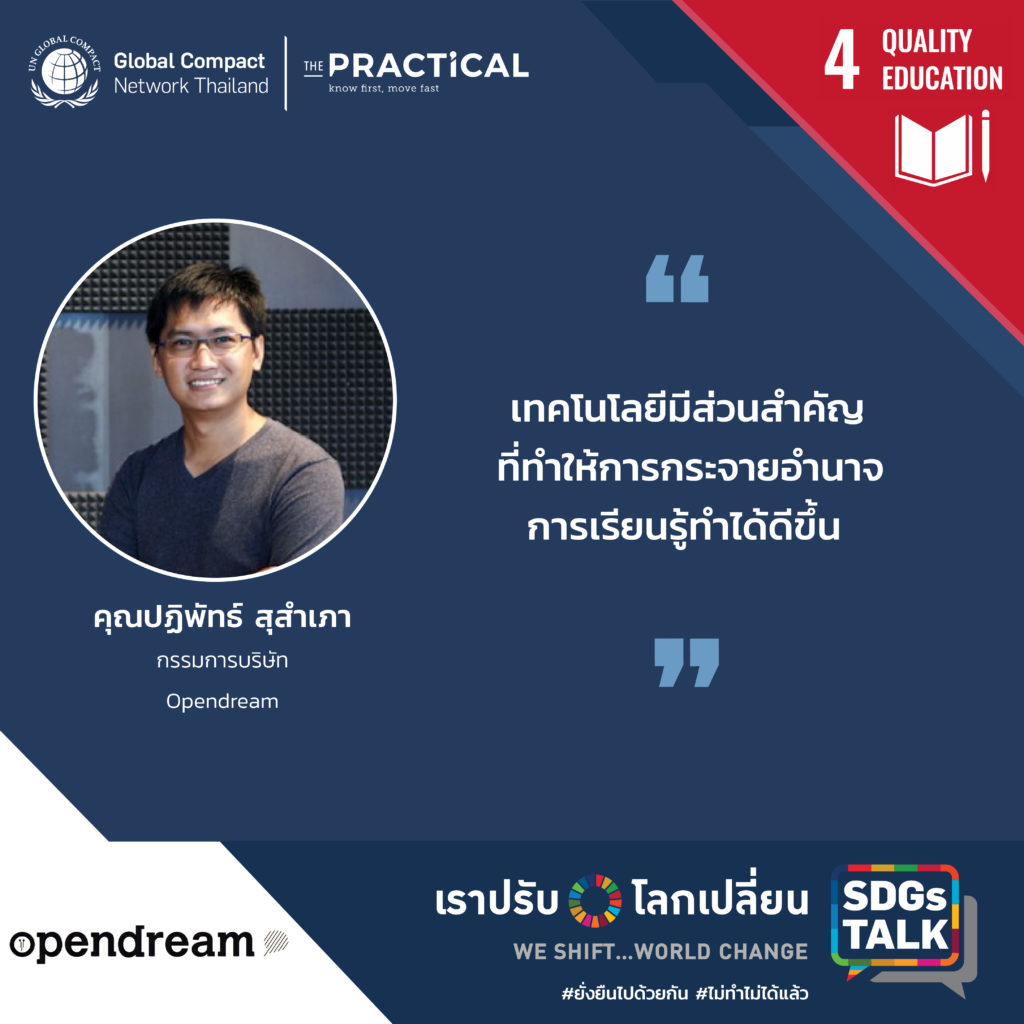
โดยทาง Open Dream ได้เริ่มทดลองทำงานร่วมกับพี่น้องชนเผ่า จังหวัดเชียงใหม่ โดยส่งเสริมทักษะดิจิตัล 2 ทักษะให้พี่น้องชนเผ่าที่มีโอกาสน้อยและอยากทำงาน ให้มีทักษะในการใช้เครื่องมือดิจิตัล เพื่อใช้ในการทำงาน ส่วนแผนในอนาคต จะพยายามขยายโครงการนี้ให้เป็นธุรกิจ ที่สามารถช่วยธุรกิจที่ต้องการ digital transform ได้ด้วย
การศึกษาเพื่ออนาคต ต้องสอดรับกับ 6 เทรนด์สำคัญ
บทสนทนาเดินมาถึงช่วงสุดท้าย ด้วยคำถามที่ว่าอนาคตของการศึกษาไทยจะเดินหน้าไปในทิศทางใด รศ.ดร. สมภพ ระบุชัดว่าการจัดการศึกษาในอนาคต ต้องจับทิศทางวิถึใหม่ว่าจะไปสู่ทิศทางไหน โดยคำนึงถึง 6 แนวโน้มที่สำคัญ ได้แก่
1) Digitalization ภายใต้ 5G ที่จะนำไปสู่การเปลี่ยนแปลงมากมาย
2) Medicalization พัฒนาการทางการแพทย์จะเกิดขึ้นมากและรวดเร็ว เมื่อ 5G มาพร้อมเทคโนโลยีสมัยใหม่
3) Climatization ในอนาคตการเปลี่ยนแปลงบรรยากาศโลกจะเป็นตัวแปรสำคัญ กระแสใหม่ด้านสิ่งแวดล้อมที่จะมีมากขึ้น
4) Financialization พัฒนาการการเงินโลกเกิดขึ้นมากมาย จะสร้างคนที่มีความสามารถอ่านออกเขียนได้ทางการเงินอย่างไร
5) Virtualization สังคมเสมือนจริงจะเกิดขึ้นอย่างกว้างขวาง นำไปสู่การบริโภคเสมือนจริง พร้อมไปกับการบริโภค
ทางกายภาค เราจะจัดการอย่างไร
6) Urbanization เมืองจะขยายตัวไปต่างจังหวัดมากขึ้น มี smart city ที่ใช้เทคโนโลยีสมัยใหม่และเป็นมิตรกับสิ่งแวดล้อม
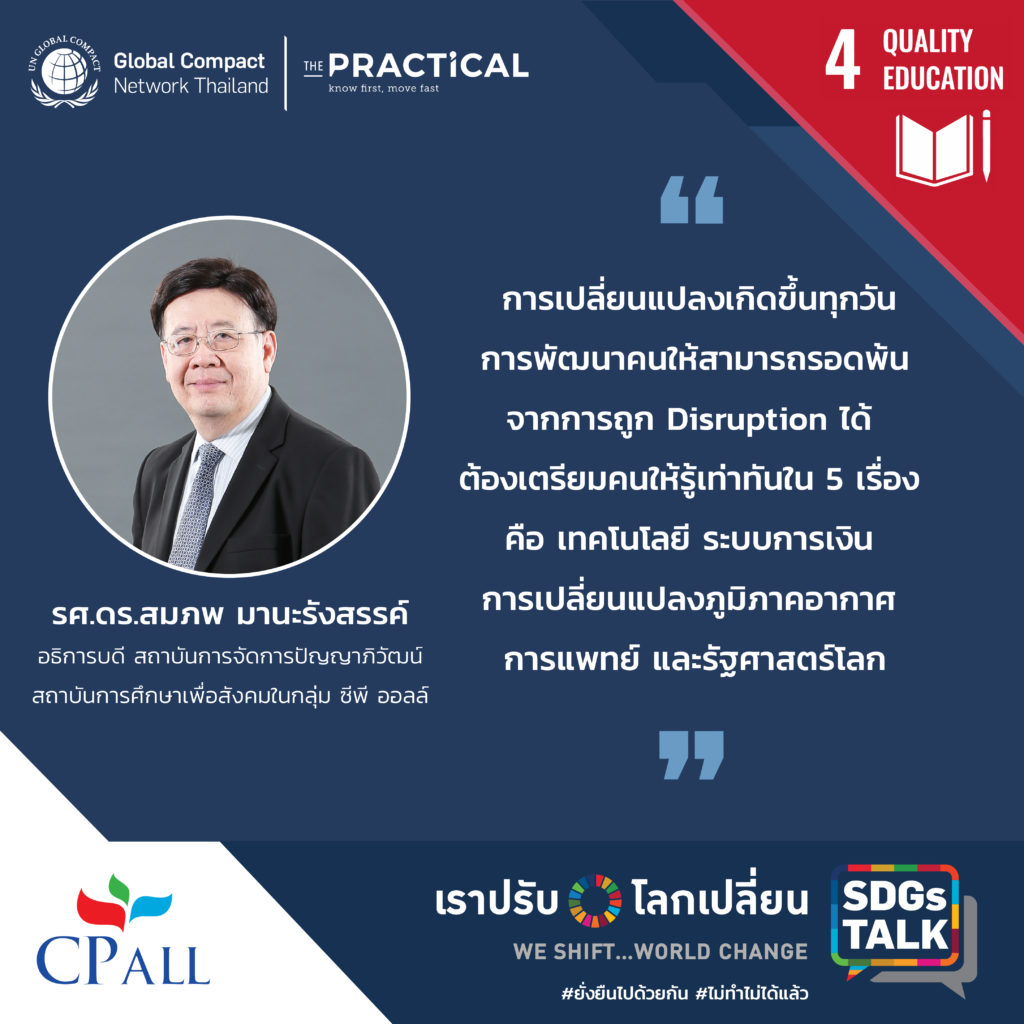
พร้อมย้ำว่า การเปลี่ยนแปลงเกิดขึ้นทุกวัน เราต้องเตรียมคนให้รู้เท่าทันใน 5 เรื่อง คือ รู้เท่าทันด้านเทคโนโลยี รู้เท่าทันการเปลี่ยนแปลงระบบการเงิน การเปลี่ยนแปลงภูมิอากาศโลก การแพทย์ และปัญหาภูมิรัฐศาสตร์โลก
เช่นเดียวกับ คุณปฏิพัทธ์ ที่ย้ำว่า การศึกษาเรียนรู้ไม่ควรเกิดในห้องเรียนอย่างเดียว ความรู้บางอย่างเหมาะกับการเรียนแบบดั้งเดิม แต่ความรู้บางอย่างเหมาะกับการกระจายอำนาจ ถ้าทำให้โอกาสการเรียนรู้ทั้งสองแบบเกิดได้ใกล้กัน ก็น่าจะทำให้มนุษย์ในอนาคตมีความมั่นคงด้านทักษะมากขึ้น และเทคโนโลยีจะมีส่วนสำคัญให้การกระจายอำนาจการเรียนรู้ได้ดีขึ้น virtualization ก็เป็นตัวช่วยให้การเรียนรู้แบบกระจายศูนย์เกิดขึ้นได้ โดยผู้มีทักษะและผู้ต้องการทักษะต้องมาร่วมกันเพื่อสร้าง career path ใหม่ๆ เพื่อคนในยุคอนาคตจะมีทางเลือกในการใช้ชีวิตได้มากขึ้น
บทสรุป
“All for education, Education for all”
ปิดท้ายที่ ผศ.อรรถพล ที่ตอกย้ำว่า เมื่อเราพูดถึงการศึกษาที่มีคุณภาพสำหรับทุกคน ต้องไม่ลืมว่าทุกคนต้องมีส่วนร่วมสร้างการศึกษาที่มีคุณภาพด้วย (Quality education for all , All for quality education) โดยอย่ามองว่าการศึกษาเป็นเรื่องโรงเรียนเท่านั้น เพราะการเรียนรู้ของเด็กไม่ได้อยู่บนการเรียนรู้ที่เป็นทางการอย่างเดียว บทบาทของพ่อแม่และชุมชนจึงมีความสำคัญมาก ที่จะก่อให้เกิดการเรียนรู้ที่หลากหลาย
ซึ่งเมื่อเกิดสถานการณ์โควิด-19 พบว่าถ้าความสัมพันธ์ระหว่างพ่อแม่กับโรงเรียนดี การมีส่วนร่วมระหว่างโรงเรียนและบ้านดี โรงเรียนนั้นจะรับมือกับโควิดได้ ทำให้เห็นว่าขนาดของโรงเรียนมีส่วนสำคัญจริงๆ เพราะขนาดของโรงเรียนมีผลต่อขนาดของผู้ปกครอง และนี่อาจจะเป็นทางออกของโรงเรียนขนาดกลางและขนาดเล็ก ที่สามารถสร้างการมีส่วนร่วมของผู้ปกครองได้มากกว่า จะระดมความช่วยเหลือกันได้ง่ายกว่า เช่น ในบางโรงเรียนเปิดโอกาสให้ผู้ปกครองมาสอนเรื่องอาชีพ หรือมาเป็นบอร์ดโรงเรียน มาทำร่วมทำกิจกรรมต่างๆ ซึ่งจะเป็นประโยชน์ให้ผู้ปกครองเข้าใจโรงเรียนมากขึ้น มีวิสัยทัศน์เดียวกันและเห็นเป้าหมายในการพัฒนาเด็กร่วมกันกับโรงเรียน
และทิ้งท้ายว่า สมรรถะของเด็กในยุคหน้าต้องมี 3 เรื่องใหญ่ คือ เป็นผู้เรียนรู้ด้วยตนเองได้และเรียนรู้ตลอดชีวิต (Learner Person) สามารถทำงานเป็นทีมได้ (Innovation co-creator) และเป็นพลเมืองเข้มแข็ง (Active Citizen) โดย 2-3 ปีนี้ข้างหน้านี้ ภาครัฐกำลังทำงานเรื่องหลักสูตรฐานสมรรถนะ ที่ใช้ 3 เรื่องนี้เป็นตัวตั้ง โดยการออกแบบการเรียนการสอนในโรงเรียน ที่ให้ความสำคัญกับโรงเรียนที่บริบทแตกต่างกัน ไม่จำเป็นต้องมีหลักสูตรที่เหมือนกัน แต่ให้ความสำคัญกับการศึกษาที่เน้นสมรรถนะผู้เรียนและความพร้อมของเด็กเป็นตัวตั้ง นี่คือ โจทย์ใหม่ ที่สถาบันการศึกษาต้องเรียนรู้ร่วมกันกับพ่อแม่ผู้ปกครอง ภาคธุรกิจ และ ภาคประชาสังคม เพื่อสร้างการศึกษาที่มีคุณภาพ
….
รายการ “เราปรับ…โลกเปลี่ยน We Shift…World Change”
ตอน “การศึกษาที่มีคุณภาพ เพื่ออนาคตการศึกษาไทย”
หรือ จะเลือกรับฟังรายการ ในรูปแบบของ Podcast ได้ที่:
ติดตามชมรายการ “เราปรับ…โลกเปลี่ยน We Shift…World Change” Facebook
ได้ทาง Facebook เพจ @มนุษย์เงินเดือนพันธุ์ใหม่ หรือ Facebook Global Compact Network Thailand และ ช่องทาง Social Media ของ The Practical


